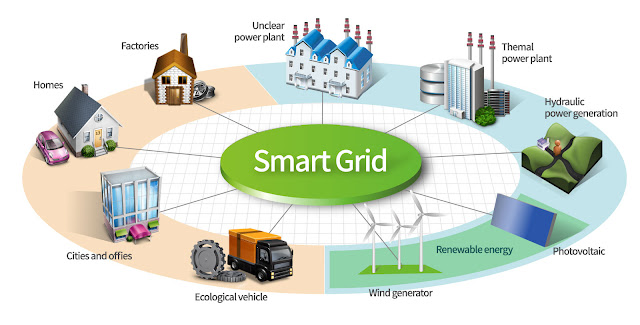Development of a Sentient Power Grid?
Smart grid? What is it? The IQ of the power systems going up? The grid becoming sentient?
I would vaguely say yes to the last two questions. Smart grid is at least at a very high level "making the electrical grid smarter". By "smarter" what is really means is more efficient, but smart grid sounds cooler than "more-efficient grid" so the choice makes sense.
One problem with power distribution and really any public service that needs large scale, large distance distribution is peak needs. Say we only need an average of 100 MW for a region however we only need 10 MW between 10:00 am and 4:00 pm but we need 200 MW at 8:00 am when everybody wants to take a shower with hot water. The power company will need to be able to provide 200 MW of power or risk customers going out of service.
During that peak time many people may be trying to do additional activities that require power that can be done at any given time. For example somebody puts on laundry before going to work so that their laundry is clean when they get home from work. They set it on before they go to work and it runs right away. From the user's perspective it won't mater if the machine turns on at 8:00 am, 10:00 am or even 3:00 pm as long as it is completed before their return at 5:00 pm. This is where smart grid technology will come in. Thing that need power (water heaters, toasters, hair dryer) can get power for that peak but things that are not time sensitive will get pushed to a later time when the need for power is much less.
Why this is such a big concern is how power companies will get the needed extra power boosts for the peak usage times. In my city we have a moderate size hydroelectric dam upriver from us. Renewable energy is fantastic but timing it can be difficult. The power company will let water through the dam slowly during non-peak hours but will increase it to maximize power when needed. But what will happen when our nuclear, wind, solar and hydroelectric power isn't enough for the users? Coal and other fossil fuels are a quick and easy way to get lots of power with a fairly small financial cost but a much larger environmental impact.
Smart grid will allow control of devices in user's homes like dishwashers, washers and dryers, heating, cooling, to allow optimal power usage. If we can drop that peak value of consumed power we are effectively helping the environment by reducing the amount of quick and dirty power we are producing. As already mentioned we will be able to level the load on the system during peak hours.
One thing that is also being looked at more and more is storing renewable energy like wind and solar to then be used during peak hours instead of whenever it is available. As battery technology improves so will the potential for storing large amounts of power, thus making the grid even more efficient and reducing the environmental impact.
At my university there is actually a Sustainable Power Research Group developing Smart Grid. It is always really cool to be able to see cutting edge research being done at your educational institution. They are working in collaboration with NB Power (power company for my province) and Siemens (German tech giant).
There are some problems with implementing smart grid but as time goes on it should get easier. Needing most devices to be able to be able to send and receive their power data overnight isn't going to be possible. So as the internet of things grows, it shall only help improve smart grid's implementation. Being able to collect all power usage data from every device would allow the power company to more accurately provide the correct amount of power, reducing waste and allowing lower power generation costs.
I do hear and understand some concerns and worries about smart grid and the relating technologies. Having to surrender your user data about how you are using your devices is something that some people would dislike. I fully understand that but at the same time the amount of money that could be saved is a lot. I don't have any exact figures but I would expect a lot. As my prof for Electric Machines and Design said (also a member of the Sustainable Power Research Group), "nobody that works in power will listen to you or care unless it saves them money". So if they are able to save money, they will most likely also try and save you money (fingers crossed on that part).
Even if we are to ignore the financial benefits of smart grid, the environmental benefits are pretty fantastic. THINK OF THE CHILDREN!




Future of Storage lays in H-bond hydride ionic bond storage , but cant imagine anyone here to have physics simulator experience of Mg2H6 or Diboron Hexahydride
ReplyDeleteI don't know. I have seen some really great things coming out of carbon nanotubes made into batteries. Crazy high number of charges and discharge cycles with no performance reduction for a long time.
Delete